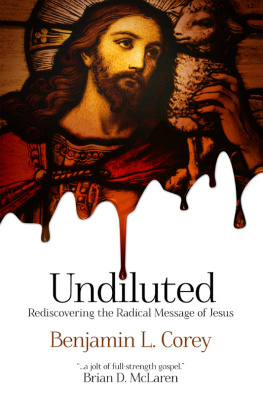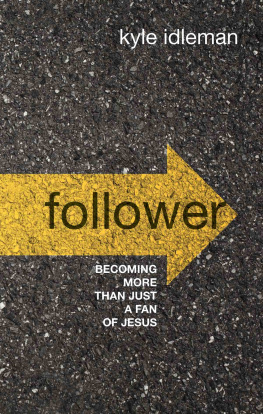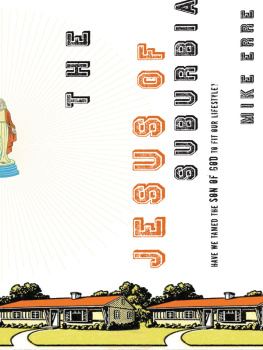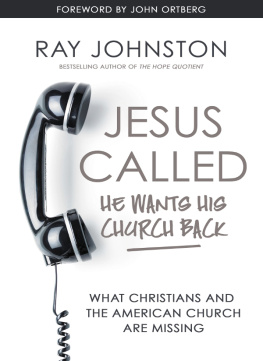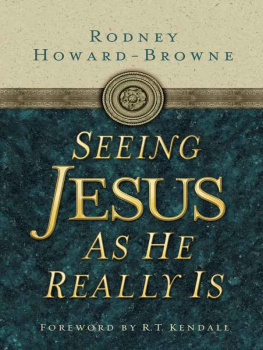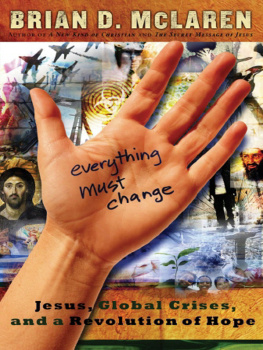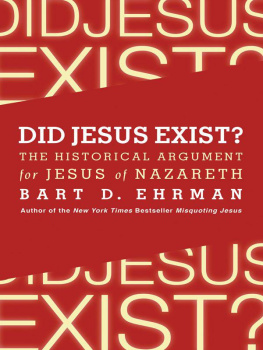Acknowledgments
T his book only exists because the journey occurred, which means that first and foremost, I wish to thank my wife, Tracy. Thank you for believing that God had more for my life, for believing we could find a Christianity worth living, and for not giving up in pushing me toward seminary. The person I am today is only because of your influencewithout you, I wouldnt have discovered any of this. I will forever be thankful that you were part of this journey of faith.
I wish to thank all of the faculty and staff at Gordon-Conwell and Fuller Theological Seminary who have played a part in my faith journey. Most especially Dr. Adonis Vidu: thank you for your kindness, generosity, and inspiration. Dean Borgman, while you probably dont even remember who I am, you ruined my lifethank you! Dr. Paul Martindale, thank you for teaching me how to separate culture from my faiththat was perhaps one of the most useful things I learned in seminary. Dr. David W. Gill, thank you for helping me to rediscover the radical, countercultural life that can be found in the beatitudes.
To all of my friends back in the North Shore, thank you. Phil Wyman, you have always inspired me with your undiluted love for people. Jeff Gentry, thank you for authenticity and for inviting me into a new world. To everyone in the Changs life group and all the folks who were part of Vida Real, thank you for teaching me about community and doing life together. A special thanks to Chris and Melissa, and Sarah and Karlos for being available on a moments notice during the rough chapters.
To those who continue to shape my present journey, thank you for the many ways in which you walk beside me. Dr. Joe McGarrya mentor, friend, and the older brother I never hadyou have continually been a source of encouragement during this journey. Rogier van Bakel, my favorite (friendly) atheist in the whole world, thank you for your friendship over the years. To the many MennoNerds out therethank you for showing me that I hadnt really discovered anything new at all, but simply rediscovered what the Anabaptists have known about God all along. Brian McLaren, thank you for your kindness and shaping my journey in more ways than you know. And, to my friend Frank Schaeffer, thank you for opening doors for me when I was too short to open them on my ownI will always be grateful.
Perhaps most importantly, to my daughter, Johanna: everything I need to know about God, I learned from adopting you. I pray that your roots will grow deep in Gods love so that you will experientially know how wide, how long, how high, and how deep is his love for you.
And, of course, to the folks at Destiny Imagethank you for believing that this is a story that needed to be told.
About Benjamin L. Corey
Ben is an author, writer, speaker, and minister.
He holds a Master of Arts in Theology from Gordon-Conwell Theo logical Seminary in South Hamilton, Massachusetts, a Master of Arts in World Missions (Cum Laude), also from Gordon-Conwell, and is a member of the Phi Alpha Chi Honors Society.
Ben is currently a doctoral student at Fuller Seminary for the degree of Doctor of Missiology. His field of study is church mobilization for the purposes of addressing cultural injustices; his dissertation topic is a discovery of the best practices of human trafficking aftercare which best promote shalom in the lives of those who have been freed from modern slavery.
He also serves as the Scholar in Residence for the Foundation for Hope and Grace and is a co-founder of the Not Here Justice in Action Network.
A lover of the miracle of adoption, he and his wife have chosen adoption as a lifestyle, to show solidarity with the poor and vulnerable of this world.
He currently lives in Auburn, Maine with his wife Tracy and their Incan Cowgirl, Johanna (11).
Ben is a contributor for Sojourners, Red Letter Christians and Evangelicals for Social Action but can be primarily found writing at his personal blog, Formerly Fundie, on Patheos. To see what hes currently up to, just visit www.benjaminlcorey.com
Contact/Media Inquiries:

But whoever drinks the water I give them will never thirst (John 4:14).
T he other night I was cooking some rice for dinner and quickly realized I had made a crucial mistake: I measured the water-to-rice ration incorrectly, and accidentally watered the whole batch down. As it simmered, I secretly hoped that eventually the extra water would burn off and things would be fine.
Unfortunately, it didnt work out that way.
While the water seemed to boil down and evaporate, watering it down in the beginning still resulted in ruining the entire pot. The faces in my home were not happy as I nonchalantly slopped a big scoop of soggy, watered-down rice, onto their plates.
Looking back, my first mistake was buying a cheap American version of rice, which can be cooked in less than five minutes, instead of the long-grain Jasmine rice the family prefers. However, I exacerbated the situation by measuring by sight instead of by measuring cup, and watered it down past the point of being edible.
It was just a flavorless, soggy, unappetizing, American version of what should have been a tasty dish. You could still legitimately say that it was rice, but it wasnt all that rice was meant to be.
Food tastes the best when it isnt watered-down. When we more carefully pay attention to a recipe and get all of the elements of a dish measured out to their intended proportions, it becomes not only nutritious, but tasty as well.
Lately Ive been thinking that the message of Jesus is a lot like this batch of riceappetizing and filling in the original form, but completely bland when watered-down and slopped onto our plates by a cook who didnt pay attention to the instructions on the side of the box.
For far too long in contemporary Christian culture weve watered-down the message of Jesus to the point that many people are no longer attracted to it. Its easy to look at these people who push the plate back with a no thank you and think that theyre refusing the rice altogether. The truth? I think theyre just pushing back the soggy, watered-down version weve slung onto their platesand they would have a completely different reaction if we invited them to taste this meal as intended, instead of our cheap, simmered down, American version.
Theyre not looking for an American Jesus, theyre looking for the real deal. People dont want the watered-down message of Jesus weve been trying to feed them for the past two generationstheyre looking for something more authentic, something more applicable, something morereal.
Before we go any further, I imagine there is a chance that the term watering down the gospel triggers something in youit does for me as well. The accusation that some other group or person is watering down the gospel is an easy one to make. Its an accusation Ive heard many, many times over the yearsand have even been on the receiving end of it a time or two. I once wrote a post on my blog at Patheos, which spoke out against violence and oppression and was accused by a reader of preaching a: liberal, watered-down, democratic, toothless and people-pleasing gospel.
The accusation that someone else is watering down the message of Jesus is an accusation we make too freely.
And, if youve been part of American Christianity very long, Im sure youve heard (or even used) this term as well.
Often when someone else is saying something that sounds a little too loving, a little too inclusive, or a little too _________, we quickly dismiss them by saying theyre watering down the gospel. Ive heard the phrase slung a million times in self-serving situations by people who wish to dismiss anothers point of view without actually wrestling with the issue at hand. I confess, Ive done it myself in the past.

